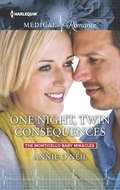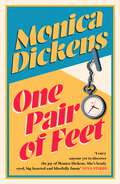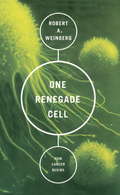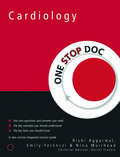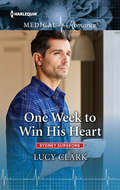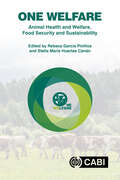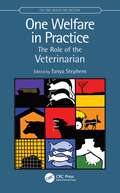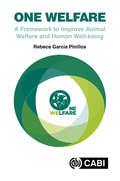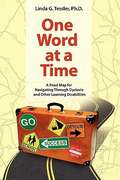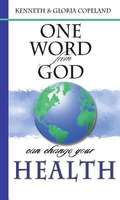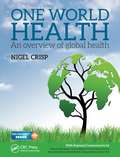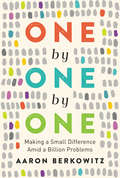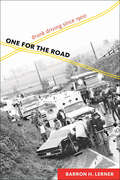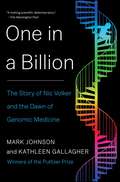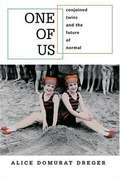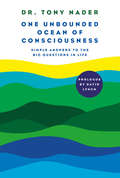- Table View
- List View
One Night, Twin Consequences (The Monticello Baby Miracles #1)
by Annie O'NeilUnexpected surprises come in twos! When Dr. Matteo Torres invites nurse Harriet Monticello to work with orphans in Buenos Aires, her head says yes! It's something she's always wanted to do...although her heart is wary of the irresistible off-limits doc. Shy Harriet isn't used to taking anything for herself, and yet before they board the plane for Argentina, the chemistry between them combusts and they give in to just one night together... But their night of recklessness isn't without consequences. And now Harriet has nine months to melt this brooding doctor's heart!
One Night...with Her Boss
by Annie O'NeilHer Valentine's fling! Usually cautious Dr. Ali Lockhart is starting afresh and leaving the ghosts of her life-changing accident behind. A Valentine's fling is just what she needs before starting her new career as a sports physician...but then her handsome stranger turns out to be her new boss! Dr. Aidan Tate's steely exterior hides a devastating heartbreak, but keeping things strictly professional with the tantalizing Ali is increasingly difficult. Especially as after that steamy night, what is forbidden promises to taste all the sweeter...
One Pair of Feet: The Entertaining Memoirs of a Young Nurse During World War II: A Virago Modern Classic (Virago Modern Classics #104)
by Monica DickensOne Pair of Feet is not just a spirited and entertaining account of the training of a hospital nurse in wartime but a fascinating glimpse into a time and a culture so recent and yet so utterly changed' Marina LewyckaAs the effects of the war raging in Europe begin to be felt at home in London, Monica Dickens decides to do her bit and to pursue a new career, and so enrols as a student nurse at a hospital in rural Hertfordshire. By nature clever and spirited, she struggles to submit to the iron rule of the Matron and Sisters, and is alternately infuriated and charmed by her patients. That's not to mention the mountains of menial work that are a trainee's lot. But there are friends among the staff and patients, night-time escapades to dances with dashing army men, and her secret writing project to keep her going.'A brilliantly funny account' Elizabeth Bowen
One Pair of Feet: The Entertaining Memoirs of a Young Nurse During World War II: A Virago Modern Classic (Vmc Ser. #108)
by Monica DickensOne Pair of Feet is not just a spirited and entertaining account of the training of a hospital nurse in wartime but a fascinating glimpse into a time and a culture so recent and yet so utterly changed' Marina LewyckaAs the effects of the war raging in Europe begin to be felt at home in London, Monica Dickens decides to do her bit and to pursue a new career, and so enrols as a student nurse at a hospital in rural Hertfordshire. By nature clever and spirited, she struggles to submit to the iron rule of the Matron and Sisters, and is alternately infuriated and charmed by her patients. That's not to mention the mountains of menial work that are a trainee's lot. But there are friends among the staff and patients, night-time escapades to dances with dashing army men, and her secret writing project to keep her going.'A brilliantly funny account' Elizabeth Bowen
One Perfect Stranger: An utterly gripping psychological thriller with a heart-stopping twist
by R.B. Egan'OMIGOSH! SO riveting, action-packed, THRILLING and exciting!... So many TWISTS and turns!' Reader review ⭐⭐⭐⭐⭐'Gripping and heart-pounding... with a jaw-dropping twist!' Reader review ⭐⭐⭐⭐⭐'Absolutely thrilling ride. An edge of the seat book' Reader review ⭐⭐⭐⭐⭐ Would you commit a crime to save your family? Nicole had the perfect life, with her handsome surgeon husband Mark, their two young daughters and a beautiful big house. But everything changed when Mark suddenly left his job at the hospital six months ago. He's distant. Keeping secrets. And they are out of money. Then Nicole gets a strange message: There is a million euros in your bank account. All you need to do is drive a car. Yes, or no? This would be the answer to her prayers. It would save her family. But who sent it? What do they really want from Nicole? And why hasn't Mark come home? An absolutely addictive and gripping thriller with twists and turns you just won't see coming. Fans of Lisa Jewell, TM Logan and CL Taylor will be hooked from the very first page. Everyone is gripped by One Perfect Stranger:'Pace, action, intrigue, mystery, dark secrets, relatable characters and an intricately woven plot. I devoured it in one weekend... Fantastic' Andrea Mara'This thriller is like jumping into a moving car and going full speed!... It's impossible to guess who was behind everything until the reveal, and then my jaw dropped! Whatever I expected, I didn't expect that! The twist took me totally unprepared!' Reader review ⭐⭐⭐⭐⭐'A tense, taut, pacy read' Jane Corry 'Intense and twisting mystery that surprised me at every turn. Thrilling stuff!' C.M. Ewan 'A suburban nightmare of secrets, lies and labyrinthine twists' Catherine Kirwan
One Pound, Twelve Ounces: A Preemie Mother's Story of Loss, Hope, and Triumph
by Melissa HarrisMelissa Harris&’s dream of being a mother again shatters when a fertility doctor tells her she may never have another child due to a physical anomaly in her uterus. Determined to persevere, she undergoes nine surgeries and a year of fertility treatments until she finally gets a positive pregnancy test—only to miscarry both twins within the first fifteen weeks. When what she&’s decided will be her last attempt results in her finally becoming pregnant, she&’s told that this baby, Sam, is also at risk. While lying in a hospital bed for six days, trying to get to the golden standard twenty-four-week gestation mark, Melissa makes a decision—she will give this baby every chance to live, no matter what it takes.One Pound, Twelve Ounces is the journey of one mother&’s determination to give her micro-preemie a fighting chance, and the story of that baby&’s remarkable battle to survive.
One Renegade Cell: How Cancer Begins
by Robert A. WeinbergCancer research has reached a major turning point, and no one is better qualified to explain the past two deacades' dramatic leaps forward in understanding this disease than world-renowned molecular biologist Robert Weinberg, director of the Oncology Research Laboratory at the Whitehead Institute in Cambridge, Massachusetts. In One Renegade Cell, Weinberg presents a state-of-the-art account of how cancer begins and how, one day, it will be cured.
One Stop Doc Cardiology (One Stop Doc)
by Rishi Aggarwal Emily Ferenczi Nina MuirheadThe One Stop Doc books have been designed by medical students for medical students to consolidate their knowledge, subject by subject and system by system. For each area studied there are only so many questions an examiner can ask; they are presented here with clear explanations that allow students to revise thoroughly one topic at a time. While do
One Strong Girl: Surviving the Unimaginable, A Mother's Memoir
by S. Lesley BuxtonA mother&’s award–winning account of what it&’s like to lose a daughter to a rare debilitating disease. One Strong Girl is a bold description of what it means to deal with deep sorrow and still find balance and beauty in an age steeped in the denial of death. At ten, India climbed the highest on the rope at gymnastics, yet by sixteen was so weak she was unable to even dress herself. The narrative follows the six-year fight for answers from the medical community. Finally, after the genetic testing of India&’s DNA, it was discovered there were two mutations on her ASAH1 gene, a deadly combination. Today her cells are alive in a research lab at the University of Ottawa. This is a legacy that cuts both ways, a point of pride and pain. One Strong Girl is a story of what it&’s like to outlive an only child. It describes the intensity of loving a dying child and most importantly, the joy to be found, even amidst the sorrow.
One Week to Win His Heart: Falling For The Pregnant Gp (sydney Surgeons, Book 1000) / One Week To Win His Heart (sydney Surgeons, Book 1000) (Sydney Surgeons Ser.)
by Lucy ClarkCan one week of passion…lead to happily-ever-after?Love has been the last thing on surgeon George Wilmont’s mind since his wife passed away. Until he meets stunning head of orthopedics Melody Janeway on the last week of his lecture tour. Their instant connection explodes into passion, but with only a week before George leaves, can a passionate fling really become a forever love?
One Weekend in Prague
by Alison RobertsEscape to Prague for a weekend in Alison Roberts's latest Harlequin Medical Romance novel, where two strangers meet and share an unlikely but unforgettable connection…For one weekend…Or forever? Before attending a medical conference, trauma specialist Mac meets stranger Hanna under the astronomical clock in Prague. Their intense connection takes him by surprise. Straitlaced Mac has never met someone like free-spirited nurse Hanna, and suddenly he&’s dropping his guard and stepping out of his comfort zone! Their unforgettable and spontaneous weekend together, touring the city and then tangling between the sheets, makes him see the world differently. But what happens when they leave Prague?From Harlequin Medical: Life and love in the world of modern medicine.
One Welfare Animal Health and Welfare, Food Security and Sustainability (One Welfare)
by Donald Broom Francisco Galindo Carmen Gallo Mateus J.R. Costa Peter Stevenson Inger Anneberg Maria Camila Ceballos Antoni Dalmau Luciandra Macedo Toledo Xavier Manteca Lohendy Muñoz-Vargas Catherine Devitt Warren Hidalgo-Jara Adolfo SansoliniThis thought-provoking book explores the link between animals, people and their social and physical environments in relation to livestock farming, food safety, food security and sustainability. Providing an overview of livestock farming and animal related food production systems in a one welfare context, One Welfare: Animal Health and Welfare, Food Security and Sustainability begins by considering the interconnections of animals, humans and their environment. It then expands into the food production system, and considers the integration of positive welfare, stress, use of welfare indicators and the economic perspective. Written by a team of international experts, and with a foreword by Andrea Gavinelli, Head of the Animal Welfare Unit in the Health and Food Safety Directorate General of the European Commission, it connects theory with best practice examples and case studies from both organizations and individuals that have successfully implemented a one welfare approach. Essential reading for academics and practitioners who work within farming, food systems and international development, this ground-breaking text is also an important read for veterinary and animal welfare professionals.
One Welfare in Practice: The Role of the Veterinarian (CRC One Health One Welfare)
by Tanya StephensAnimal welfare has long been recognised as central to the role of the veterinary professional, but this is increasingly aligned with the welfare of humans and the broader environment in which we co-exist. This is the first book dedicated to the role of the veterinarian in One Welfare, a concept that recognises the interconnections between animal welfare, human wellbeing, and the environment. The book demonstrates, through a wide range of international case studies, why professional ethics and the use of good evidence is integral to this role. Contributors bring a rich variety of writings, each with their own perception of the role of the veterinarian in improving animal welfare and human wellbeing. One Welfare in Practice: The Role of the Veterinarian emphasises the importance of interdisciplinary collaboration and solutions: it is essential that veterinary practitioners recognise when other professionals or disciplines need to be consulted to benefit both animals and humans. With its multiple, fascinating approaches to One Welfare, this book will inform and inspire the veterinarian to find areas where collaborative action reaps the greatest rewards. This unique book shows how veterinarians can and are contributing to improving animal and human welfare, offering practical advice as to how the profession can further engage in One Welfare in a range of settings.
One Welfare: A Framework to Improve Animal Welfare and Human Well-being
by Dr Rebeca Garcia PinillosContemporary and thought-provoking, this book provides a definition of the concept of One Welfare: the interconnection between animal welfare, human wellbeing and the environment. The book establishes a conceptual framework, in five sections, resulting from a three month global consultation on a draft proposal comprising nine areas. The book contains: - A one welfare approach which complements and extends the existing one health approach - A range of prestigious contributions from key opinion leaders in the field of animal welfare which help to define the framework - A platform for the development of more collaborative and integrated animal welfare standards and policies One Welfare complements the One Health and Eco Health approaches, enabling full integration of animal welfare within other disciplines; a much needed tool to help improve animal welfare, human wellbeing and environmental components and support worldwide sustainable development goals. Integrating this concept into existing projects could help to foster collaboration to improve human and animal welfare globally. This text is of interest to those working in the fields of animal and human welfare, sustainability and conservation, international development and to all those keen to extend the one health approach to animal welfare and human wellbeing.
One Welfare: A Framework to Improve Animal Welfare and Human Well-being
by Rebeca García PinillosContemporary and thought-provoking, this book provides a definition of the concept of One Welfare: the interconnection between animal welfare, human wellbeing and the environment. The book establishes a conceptual framework, in five sections, resulting from a three month global consultation on a draft proposal comprising nine areas. The book contains: - A one welfare approach which complements and extends the existing one health approach - A range of prestigious contributions from key opinion leaders in the field of animal welfare which help to define the framework - A platform for the development of more collaborative and integrated animal welfare standards and policies One Welfare complements the One Health and Eco Health approaches, enabling full integration of animal welfare within other disciplines; a much needed tool to help improve animal welfare, human wellbeing and environmental components and support worldwide sustainable development goals. Integrating this concept into existing projects could help to foster collaboration to improve human and animal welfare globally. This text is of interest to those working in the fields of animal and human welfare, sustainability and conservation, international development and to all those keen to extend the one health approach to animal welfare and human wellbeing.
One Word at a Time: A Road Map for Navigating Through Dyslexia and Other Learning Disabilities
by Linda G. TesslerA unique and groundbreaking resource guide that is informative, insightful and inspiring, this book is Tessler's brave and honest account of her lifelong struggles with dyslexia. Culled from her experiences as a psychologist and scholar specializing in learning disabilities and as the parent of a son who struggles with dyslexia, she brings together sound psychological principles with personal knowledge.
One Word from God Can Change Your Health
by Kenneth Copeland Gloria CopelandThis book is a list of articles by various people including Kenneth and Gloria Copeland, Marty Copeland, Charles Capps and others. All of these articles have to do with healing.
One World Health: An Overview of Global Health
by Lord Nigel CrispThis brand new textbook presents a new approach to the teaching and understanding of global health. It describes the shared opportunities but also the problems that we all face, wherever we live, and the particular needs of the poorest people in every society. Covering subjects from epidemics and climate change, the need to staff and resource health services appropriately, the rich potential of science and technology, and the impacts of social and political change in the world around us, all is presented at a level appropriate for the student looking to gain an understanding of this broad and developing area.
One by One by One: Making a Small Difference Amid a Billion Problems
by Aaron BerkowitzIn the spirit of Tracy Kidder’s Mountains Beyond Mountains, and joining the ranks of works by Bryan Stevenson, Matthew Desmond, Abraham Verghese and Oliver Sachs, the inspiring story of a young American neurologist’s struggle to make a difference in Haiti by treating one patient—a story of social justice, clashing cultures, and what it means to treat strangers as members of our family.Dr. Aaron Berkowitz had just finished his neurology training when he was sent to Haiti on his first assignment with Partners In Health. There, he meets Janel, a 23-year-old man with the largest brain tumor Berkowitz or any of his neurosurgeon colleagues at Harvard Medical School have ever seen. Determined to live up to Partners In Health’s mission statement “to bring the benefits of modern medical science to those most in need,” Berkowitz tries to save Janel’s life by bringing him back to Boston for a 12-hour surgery. In One by One by One, Berkowitz traces what he learns and grapples with as a young doctor trying to bridge the gap between one of the world’s richest countries and one of the world’s poorest to make the first big save of his medical career.As Janel and Berkowitz travel back and forth between the high-tech neurosurgical operating rooms of Harvard’s hospitals and Janel’s dirt-floored hut in rural Haiti, they face countless heart-wrenching twists and turns. Janel remains comatose for months after his surgery. It’s not clear he will recover enough to return to Haiti and be able to survive there. So he goes for a second brain surgery, a third, a fourth. Berkowitz brings the reader to the front lines of global humanitarian work as he struggles to overcome the challenges that arise when well-meaning intentions give rise to unintended consequences, when cultures and belief systems clash, and when it’s not clear what the right thing to do is, let alone the right way to do it. One by One by One is a gripping account of the triumphs, tragedies, and confusing spaces in between as an idealistic young doctor learns the hard but necessary lessons of living by the Haitian proverb tout moun se moun—every person is a person.
One for the Road: Drunk Driving since 1900
by Barron H. LernerDon’t drink and drive. It's a deceptively simple rule, but one that is all too often ignored. And while efforts to eliminate drunk driving have been around as long as automobiles, every movement to keep drunks from driving has hit some alarming bumps in the road. Barron H. Lerner narrates the two strong—and vocal—sides to this debate in the United States: those who argue vehemently against drunk driving, and those who believe the problem is exaggerated and overregulated. A public health professor and historian of medicine, Lerner asks why these opposing views exist, examining drunk driving in the context of American beliefs about alcoholism, driving, individualism, and civil liberties. Angry and bereaved activist leaders and advocacy groups like Mothers Against Drunk Driving campaign passionately for education and legislation, but even as people continue to be killed, many Americans remain unwilling to take stronger steps to address the problem. Lerner attributes this attitude to Americans’ love of drinking and love of driving, an inadequate public transportation system, the strength of the alcohol lobby, and the enduring backlash against Prohibition. The stories of people killed and maimed by drunk drivers are heartrending, and the country’s routine rejection of reasonable strategies for ending drunk driving is frustratingly inexplicable. This book is a fascinating study of the culture of drunk driving, grassroots and professional efforts to stop it, and a public that has consistently challenged and tested the limits of individual freedom. Why, despite decades and decades of warnings, do people still choose to drive while intoxicated? One for the Road provides crucial historical lessons for understanding the old epidemic of drunk driving and the new epidemic of distracted driving.
One in a Billion: The Story of Nic Volker and the Dawn of Genomic Medicine
by Mark Johnson Kathleen GallagherThe breathtaking story of a young boy with a never-before-seen disease, and the doctors who take a bold step into the future of medicine to save him--based on the authors' Pulitzer Prize-winning reporting.In this landmark medical narrative, in the tradition of The Immortal Life of Henrietta Lacks and The Spirit Catches You and You Fall Down, Pulitzer Prize-winning journalists Mark Johnson and Kathleen Gallagher chronicle the story of Nic Volker, the Wisconsin boy at the center of a daring breakthrough in medicine--a complete gene sequencing to discover the cure for an otherwise undiagnosable illness. At just two years old, Nic experienced a searing pain that signaled the awakening of a new and deadly disease, one that would hurl Nic and his family up against the limits of modern medicine. For years, through false starts and failed cures, Nic holds on to life, buoyed up by his mother's fierce drive to get him the care he needs. But when even the world's experts are stumped by Nic's illness, his doctors come up with a radical, long-shot plan: a step into the unknown. The next major scientific frontier, following the completion of the Human Genome Project, was to figure out how to use our new knowledge to save lives--to bring genomic or personalized medicine into reality. It's a quest that is undertaken by researchers around the world. But it is only when geneticist Howard Jacob hears about young Nic that the finish line finally comes into sight: It's no longer a race to make history. It's a race to save this boy's life. One in a Billion is an unforgettable tale of the lives that converged to launch a medical revolution. As pioneering geneticist Mary-Claire King pronounced upon learning Nic's story: "It was as if one had heard about Case Zero of AIDS and the cure, all at once."
One of Us: Conjoined Twins and the Future of Normal
by Alice Domurat DregerMust children born with socially challenging anatomies have their bodies changed because others cannot be expected to change their minds? One of Us views conjoined twinning and other "abnormalities" from the point of view of people living with such anatomies, and considers these issues within the larger historical context of anatomical politics. Anatomy matters, Alice Domurat Dreger tells us, because the senses we possess, the muscles we control, and the resources we require to keep our bodies alive limit and guide what we experience in any given context. Her deeply thought-provoking and compassionate work exposes the breadth and depth of that context-- the extent of the social frame upon which we construct the "normal." In doing so, the book calls into question assumptions about anatomy and normality, and transforms our understanding of how we are all intricately and inextricably joined.
One unbounded ocean of consciousness: Simple answers to the big questions in life
by Dr. Tony NaderWorld renowned leader at the core of the Maharishi Foundations, a Harvard graduate neuroscientist, renowned Vedic scholar and world reference in Transcendental Meditation, Dr.Tony Nader formulates in this book a series of fundamental existential questions (what is our purpose in life, do we have true control over our destinies?) and, through the study of Consciousness, brings us answers with practical benefits that aim to give us enlightenment, peace and fulfillment. «In this landmark book, Dr. Tony Nader presents ideas that can change the world. He proposes profound solutions to questions that have long fascinated and intrigued philosophers and scientists. What is Consciousness, do we have freedom? How to get the best out of life, fulfill wishes and create peace and harmony among peoples and nations? He offers these solutions, based on a simple underlying paradigm, that unifies mind, body, and environment into an ocean of pure Being, Pure Consciousness. A must read for any seeker of answers to the mysteries of life, the absolute and ultimate truth».David Lynch «I want everyone to know what Consciousness is and how to develop it to enjoy the full potential of individual and social life».Dr. Tony Nader Is there some hidden purpose in life, a secret design, a meaningful logic, a goal to be achieved? Where do we come from and where do we go after we leave? Why should we be fighting? Can we choose? Are we free or slaves of destiny, of the laws of nature or of God? As sentient beings who wish to take control of their lives, these questions are fundamental, and everyone ends up making assumptions or strongly subscribing to beliefs about many of them. Those convictions become our underlying "cosmovision" that influences everything we do. I turned to the study of medicine, psychiatry, and neurology to understand why, although we are so similar, we can be so different in our opinions, mentality, and points of view. But the answers to my fundamental questions were too complex and abstract for scientific investigation. It was Transcendental Meditation TM that allowed me to explore them through direct experience, rather than analysis and deduction. This book is dedicated to all seekers of knowledge, scientists, philosophers, teachers, wise leaders, and guides who investigate the secrets of how nature works and the effort to improve life on Earth.
One-Night Baby with Her Best Friend (Alaska Emergency Docs #2)
by Juliette HylandIn the second installment of the Alaska Emergency Docs duet, temporarily giving in to temptation wasn&’t supposed to mean having a baby with her best friend! MR. RIGHT WAS IN FRONT OF HER ALL ALONG… ER doc Jessie has always treasured her friendship with nurse William. Until an unexpected night of passion leaves her expecting his baby! Now she must acknowledge what she&’s long denied: Jessie wants William to be more than her best friend. But William&’s previous trauma still haunts him, and Jessie&’s scared of losing what they already have. Can they find the courage to forge a life—as a family?From Harlequin Medical: Life and love in the world of modern medicine.Alaska Emergency Docs Book 1: Reunion with the ER Doctor by Tina BeckettBook 2: One-Night Baby with Her Best Friend by Juliette Hyland
